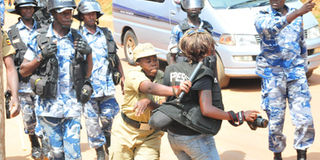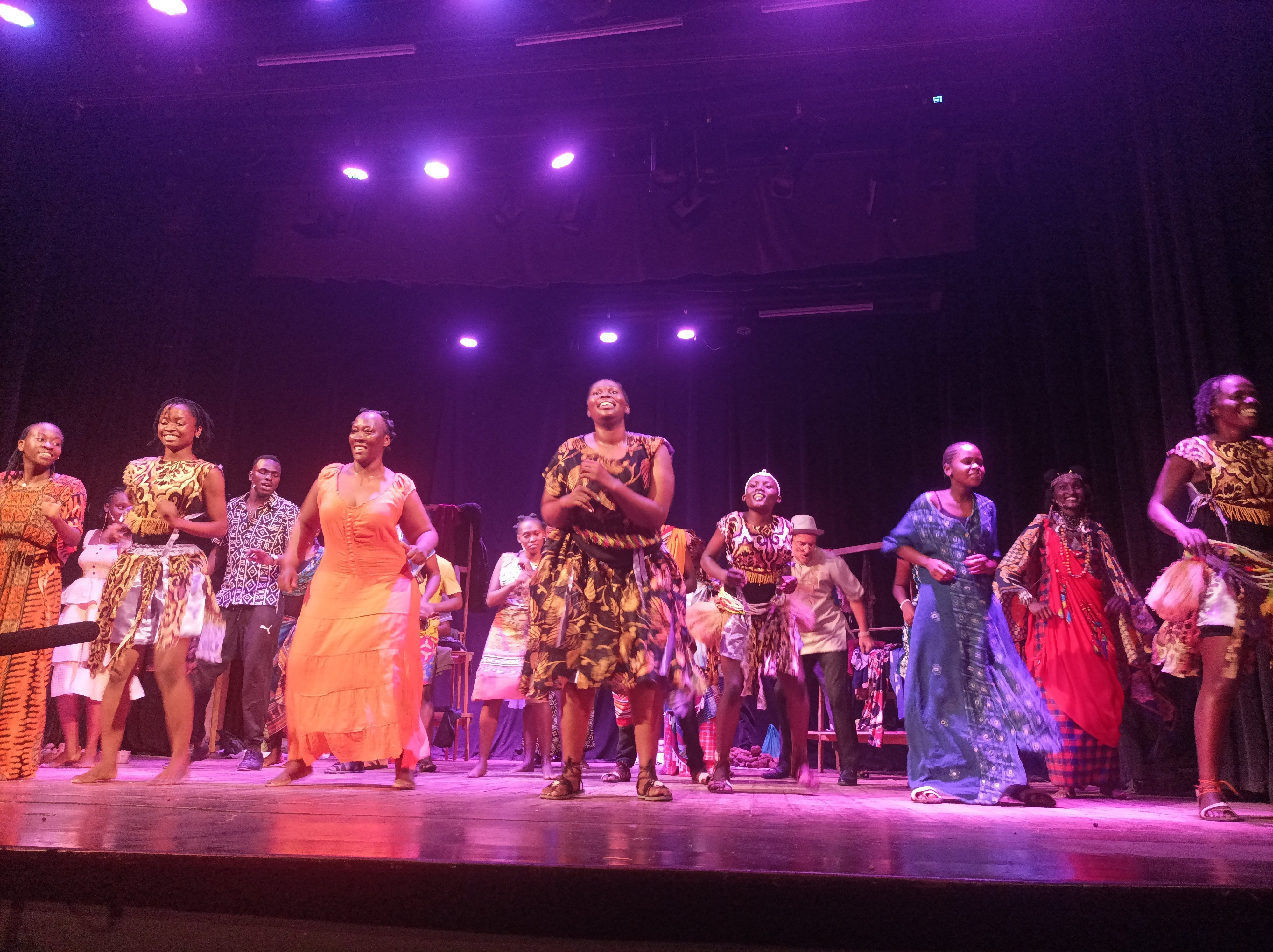When journalists are abused in the line of duty

Many journalists believe police officers misuse their authority to infringe on their freedoms. Photo by Faiswal Kasirye
What you need to know:
Every year, journalists’ rights are being violated. Some even report to the police. But what happens after such cases are reported and how can this violation be curbed?
On the evening of January 12, television footage of journalists being beaten by police officers in line of duty.
The footage showed Joram Mwesigye, the Old Kampala Division Police Commander (DPC), hitting journalists with what was later identified as an electric cable. This was during the coverage of a protest march by youth activists under their organisation Unemployed Youth.
Andrew Lwanga, a WBS TV cameraman, suffered his wrath. His camera was not spared either. Realising that their colleague was in danger, the rest of the journalists got into a scuffle with other police officers. In the process, another journalist, Joseph Ssetimba, was also attacked and his trousers torn.
Initially, he had been detained in a police cell despite the pain he was going through. It was after the journalists sought audience with the regional police commander that Lwanga was then rushed to Mulago hospital before being transferred to Nsambya hospital.
Such brutal actions by police attracted wide condemnation from the public, especially on social media with many comparing Mwesigye to a terrorist.
The following day, journalists under their rights body, Human Rights Network for Journalists Uganda (HRNJ-U), convened a press conference where they condemned the DPC’s actions and a number of issues were raised. They demanded that Mwesigye be arrested and charged in court.
They proceed to march to the police headquarters in Naguru to present their petition to police chief Kale Kayihura. However, their journey was cut short when they were again intercepted by police officers on Jinja Road. They descended on them, beat and sprayed them with pepper spray before arresting HRNJ-U national coordinator, Robert Sempala.
In the spirit of solidarity, the scribes remained camped at Jinja Road Police Station where Sempala had been detained.
This wait lasted 30 minutes before an order issued by Andrew Felix Kaweesi, the director of operations in the police, ordered for Sempala’s release, and to allow journalists to continue with their march to Naguru.
This is not the first time that the media is having run-ins with the police. In 2013, police in Rakai beat up two journalists while at work and destroyed their work tools.
That same year, a number of journalists were attacked during the media siege at Monitor Publications Limited by security personnel.
In the 2014 annual report by HRNJ-U, police emerged as the leading government organ in the violation of media freedom.
In 2013, of the 124 violations documented by the same organisation, 85 were by police and of these, 51 were physical in nature.
The 85 cases in 2013 was an increase from 46 cases in 2012. A total of 35 cases of violence were reported in 2009 and over 50 cases in 2010 with police topping the list of violators.
Inadequate disciplinary measures
Mulindwa Mukasa, a correspondent with Associated Press and one of those who have faced the police brutality before believes there are no adequate disciplinary measures in the force.
He thinks the disciplinary arm of the police has not done enough in enforcing discipline among officers which has seen continued attacks on journalists.
“Disciplining officers who take the law in their own hands goes beyond suspension. And you can imagine after the suspension, such officers are transferred to other places with promotions. This, other than deterring, encourages other officers to do the same knowing they will benefit at the end,” he says.
He says officers who attack journalists or treat other people in a brutal manner should be brought to book and also expelled from the force. That way, Mukasa says, it can teach the rest of the officers a lesson.
Fred Enanga the spokesperson of Uganda Police Force says actions of individuals cannot be tagged on the entire force.
“Police is made up of individuals just like journalism is. There are people who abuse the profession. We cannot say all journalists are bad. That is not true. The individual officers who have done contrary to what is expected of them have been brought to book and this will not stop,” he says, adding: “The media is highly competitive. There are journalists who want exclusives. Even when we put boundaries at crime scenes, they always want to break that. As the police force we cannot just watch. There are procedures in access to information and I think we need to respect that.”
Love-hate relationship

Many journalists believe police officers misuse their authority to infringe on their freedoms. Photo by Rachel Mabala
Dr Peter Mwesige, the Director of African Centre for Media Excellence (ACME), on the other hand thinks there has been an enduring love-hate relationship between the government and media. He says media freedom violations are due to a political class that does not tolerate criticism and dissent.
“Media owners who are willing to sacrifice journalistic integrity at the altar of profit-- look at journalism primarily as a business and are not always willing to stand up to the government and other forces that threaten their businesses.
Powerful advertisers who don’t respect journalism ethics exert a lot of pressure on media to publish promotional stories that don’t interrogate business and lack of media literacy within the wider population.
Freedom of expression should not be viewed as an issue for journalists and the media alone. It is a public issue. The right to free expression is for citizens, not only the media,” he says.
Ofwono Opondo, a former journalist and the Director of Uganda Media Centre, explains that the disability in the media freedom is mainly due to two reasons; training and newsroom policy.
“There is need for proper training of journalists and proper supervision from their newsrooms. Some journalists are employed in newsrooms without training just because they are claimed to be good at reporting. In the end, they abuse the ethical code of the profession. Some are too ambitious in that they want to be considered heroes. Of course I do not support the forces or public to attack them but we must all do our work within the law,” he says.
However, Sempala says, the press laws the country has are adequate and are always adhered to by journalists but that the weakness remains with police officers.
“People need to be informed in order to expend their duties well. Some officers seem not to be informed about the role and workings of the media which is unfortunate. Other leaders and politicians are also scared of public scrutiny by the media. But that notwithstanding, everyone should desist from making hate speech against the media,” he says.
He adds that the police force is just the leading violator of media freedom but there are other organs, groups and individuals who do the same. He says the efforts of ensuring media freedom will not only stop with police but also with other stakeholders.
Mariam Nalubega, chairperson of Uganda Parliamentary Forum on Media, agrees with Sempala, saying there are good laws but little is done in their enforcement.
“The freedom of expression and freedom of the media is a constitutional right that enforcement officers must respect in line of their duty. We demand that the lGP and other relevant government departments publicly condemn the deplorable actions of officers on journalists,” she says.
Way forward
Dr Mwesige advises the solution is that government must be pushed to promote and protect the right to press freedom and freedom of expression, the right of access to information, account to the public on how it uses its power and to freely share information to promote public participation, transparency and accountability.
“Advertisers must respect the media’s independence and in particular the firewall between advertising departments and newsrooms. Civil society should promote and defend the right to press freedom and freedom of expression, the right of access to information, share information with the media and hold the media accountable as well.
As for the general public, he says it must demand timely, accurate and relevant information about public affairs, share information with the media and hold it accountable too,” Mwesige explains.
He urges media owners to facilitate journalists to practise good journalism, respect the independence of the newsroom, promote and defend the right to press freedom and freedom of expression.
Further, to allow a diversity of views on their media platforms and honour the public interest mission of journalism.
Sempala encourages media houses to continue supporting the cause calling upon victims to desist from cutting back- door deals with violators in exchange for money which he says undermines justice, frustrates those volunteering legal and other services. He says this does not act as a deterrent for other violators of media freedom.
In an era where democracy is preached from most corners of the world, freedom of the press is an area that still needs more attention from everyone.
Number of journalists killed in 2014 world over
96
Number of journalists kidnapped
119
Number of journalists jailed
178
Source: 2014 Reporters Without Borders report




